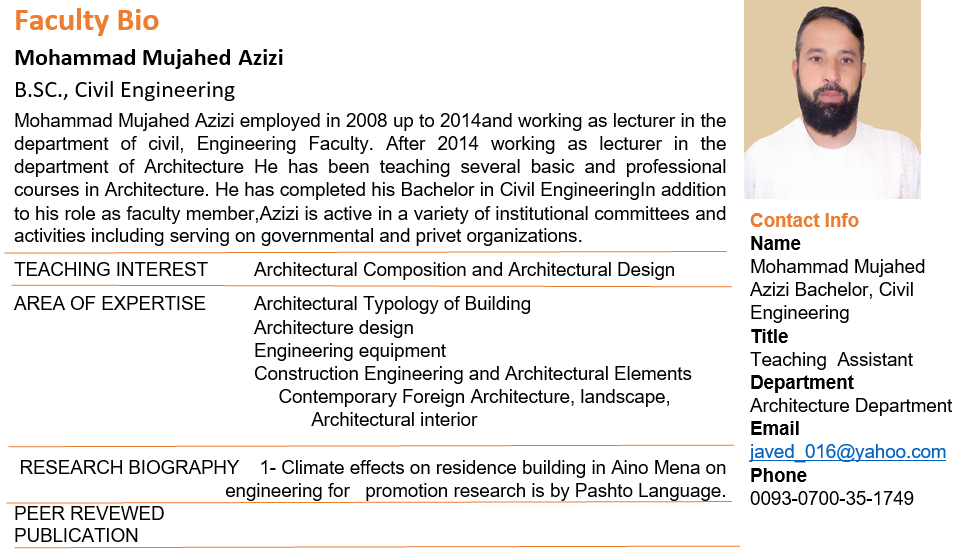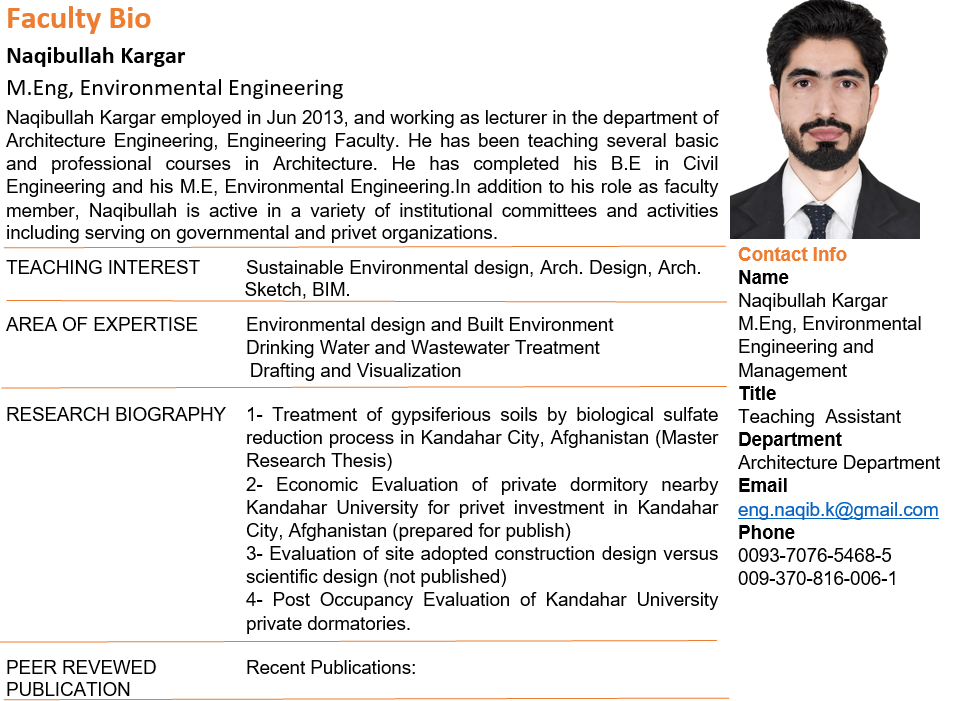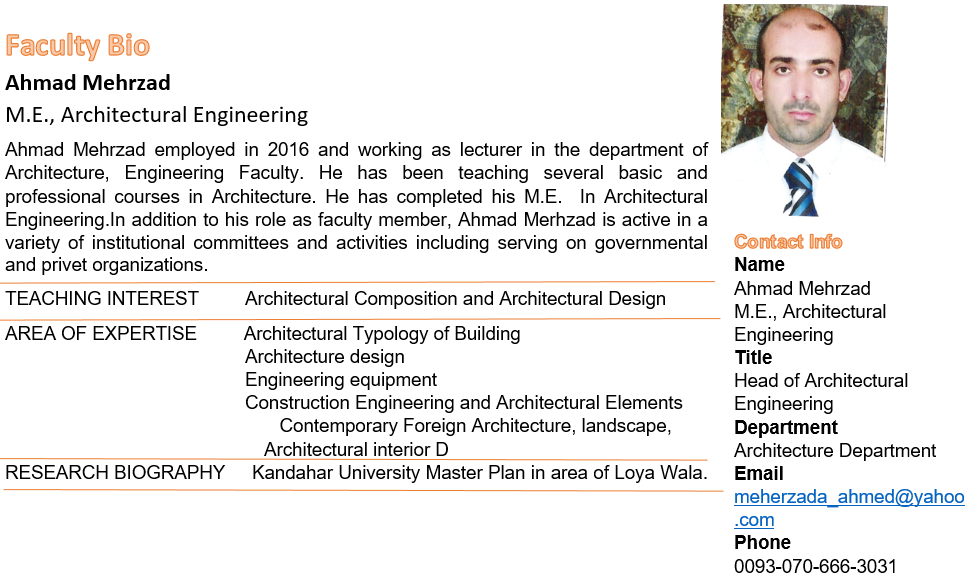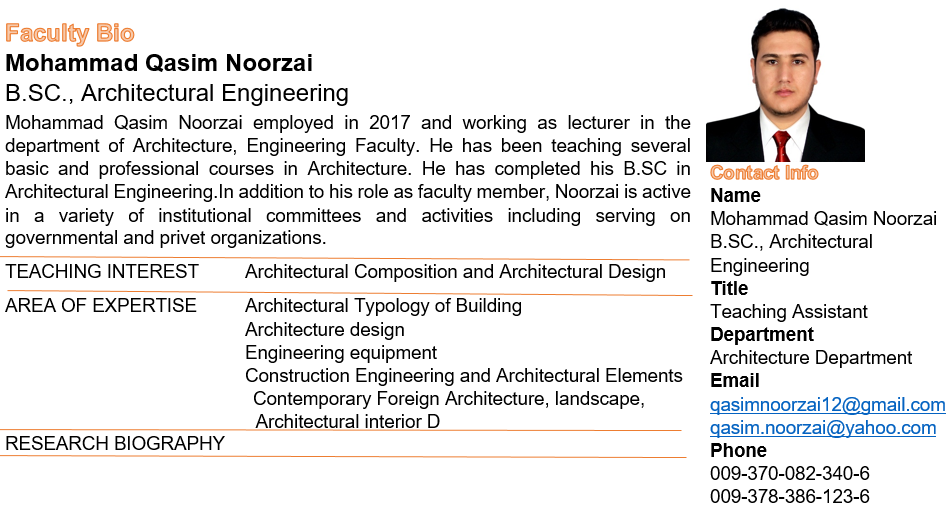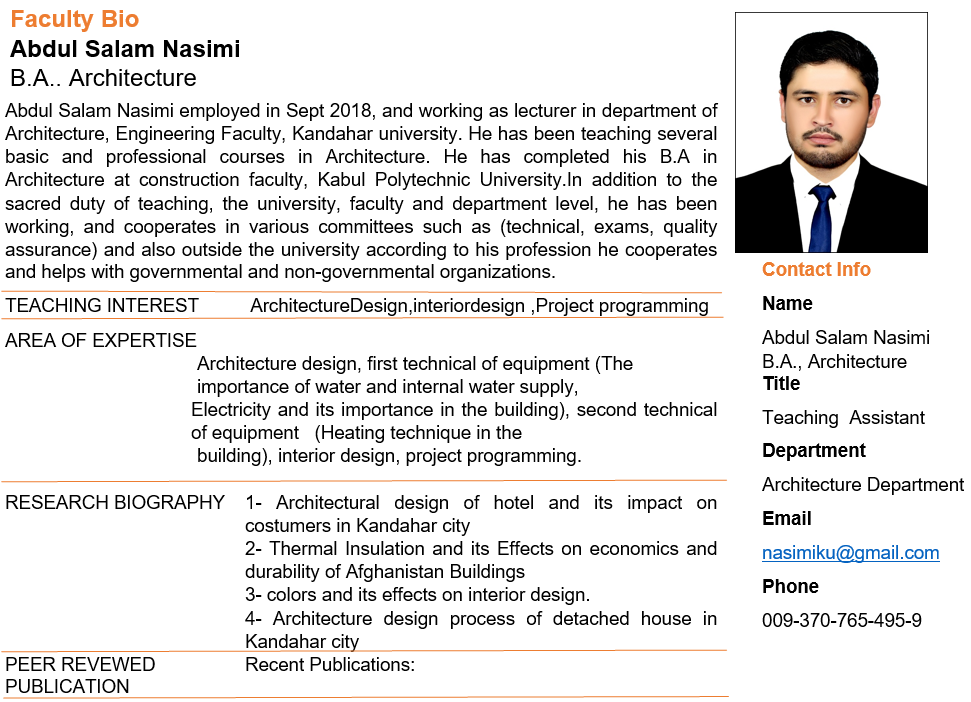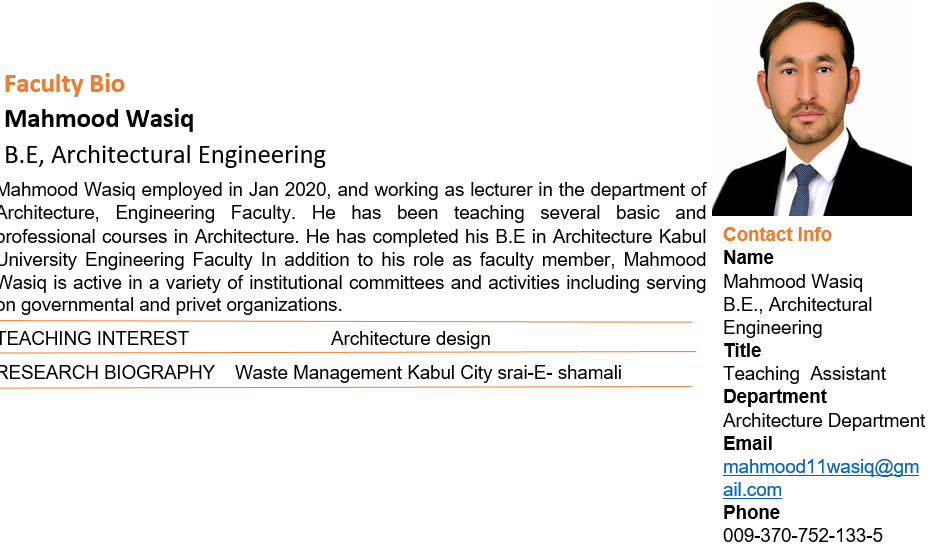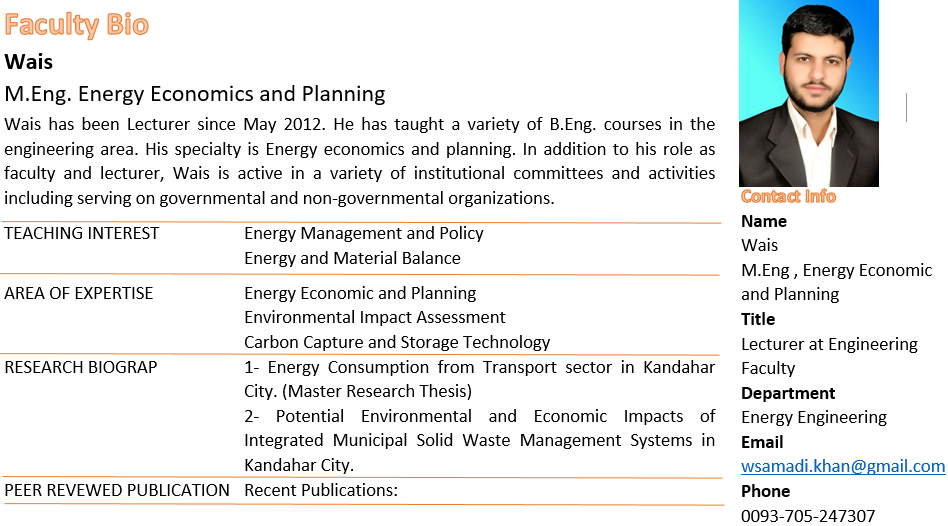Engineering
Introduction of Engineering Faculty:
The Engineering Faculty was established in Kandahar University in 2000, and is having four departments i.e. Civil Engineering, Water and Environmental Engineering, Energy Engineering and Architectural. Educational Curriculum for the Engineering Departments has been established in close co-ordination with the world class standard universities as follows:
The Civil Engineering’s educational curriculum is established in close co-ordination with Kabul and Kansas State Universities.The Water and Environmental Engineering department’s educational curriculum is established in close co-ordination with the Asian Institute of Technology (AIT) Thailand.Moreover, the Energy Engineering department has valued with financial support of USWDP, technical support of Texas A & M and Kandahar University. The Kandahar University Energy Engineering Dept. set up the educational curriculum, provision of educational material and expect an equipped laboratory in the relevant field by the end of the year 2018.Ninety-five percent of books, instructional material and assignments are in English Language, and currently 126 female students alike 1278 male students, in total 1404 students have been studying in the particular departments run by 38 permanent lecturers. And out of the specified number of teachers 90% are Master’s Degree Holders from highly reputed international universities; as well five teachers are pursuing their Doctoral degree.Up to now in the previous 17 batches, (1086) engineers are qualified and offered for the services in Civil Engineering, 3 batches ( 80 ) engineers in Water and Environmental Engineering, 3 batches (113 ) engineers in Energy Engineering Department and one batch ( 24 ) students in Architecture department.
Mission:
Engineering faculty will be a leading institution in graduation of will-known engineers, conducting advance researches and services.
Vision:
Engineering Faculty Strives to achieve its Mission by enhancing its lecturers’ capacity, applying standard curriculum, using its laboratory, library with coordination of other sectorial departments
Significant:
- Respecting to entire Islamic and Afghan rules and holy beings.
- Respecting to Afghan Government and Constitution.
- Respecting to humanity and avoiding every kind of harassment.
- Committed to its responsibility and society.
- Strong commitment to rebuild the country and avoid every kind of corruption
Academic Facilities :
- Research Laboratory (Soil and Concrete)
- Energy Engineering Laboratory
- Water Engineering Laboratory
- Library and research center
- Access to Informational sources and internet
- New Text Books
- Study rooms equipped with new technology
- Usage of Practical survey in a wide area (Practicing of survey in various fields)
- Meteorological station/center
- Drawing studios
Dean Introduction of Engineering Faculty :
Senior Teaching Assistant Abdul Ghani Noori, son of Abdul Baqi was born in the fifth district of Kandahar city. He has obtain his bachelor of engineering degree in civil engineering from Kandahar University, Afghanistan in 2013 and his master of engineering degree in energy technology from Asian Institute of Technology (AIT), Thailand in 2015. He is the specialist of energy efficient buildings, HVAC, Solar energy and energy efficiency.In addition to his role as the dean and lecturer, Mr. Noori is an active researcher in his field of specialization. He is also member of variety of institutional committees. Besides that, Mr. Noori is a member of Afghanistan Renewable Energy Union (AREU).
General information :
WEE (Water and Environmental Engineering) department was established in 2012 at Engineering Faculty by Mr. Abdul Tawab Balakarzai the previous vice chancellor of Kandahar University and Assistant Professor at Engineering Faculty, Kandahar University. It was the first department in Afghan universities called Water and Environmental Engineering Department. The purpose of its establishment is to educate capable human resources in the field of water and environment to the country especially in the south western region. Having expert faculty members and enough academic facilities are the important assets for proper operation of WEE department. Since WEE department is the first one in kind and aims to become a leading institution in the field of water and environment in the country and region.WEE department is the second department in terms of establishment after civil department in engineering faculty. The curriculum of this department was developed with the collaboration of Asian Institute of Technology (AIT), Thailand, considering the standards of Accreditation Board of Engineering and Technology (ABET) .WEE department currently has nine faculty members, which eight of them have already obtained their master degrees from well-known international universities and one of them is pursuing his master studies.
Vision :
WEE department aims to become a leading higher education institution in the country and as well as in the region to educate capable human resources, conduct researches and perform services in the field of water and environment.
The mission of WEE department is to create such an educational environment for its faculty members, students and staffs. Academic facilities namely laboratories, research facilities, access to update reference and textbooks, collaboration with national and international relevant organizations and improvement of teaching system are the main parts of the mission .
Objectives:
Water and environmental engineering department aims to:
1 Educate professionals
2 Conduct researches
3 Offer public awareness and services
Values:
1 National and international standard quality
2 Respect Islamic and Afghan values
3 Islamic and human behavior and patriotism
4. Transparency and anti corruption
Massage :
In country level, Water and Environmental Engineering (WEE) is the first established department in the legal frame of engineering faculty/Kandahar University.WEE’s curriculum meets the international norms and standards and always says most welcome to each individual in the following technical special branches.
1: Water resources engineering and their management
2: Water supply engineering
3: Irrigation engineering
4: Waste water engineering
5: Weather pollution and its prevention
6: Floods and droughts
On behalf of its kind lecturers and other employees, WEE’s head most welcomes to the newly joining students.
Warm regards
Assistant Professor Nazir Ahmad Qani
Head of the department
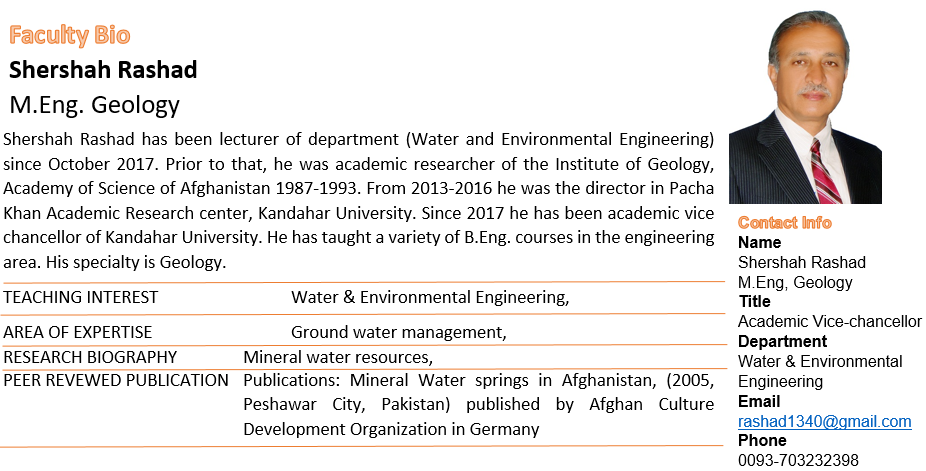
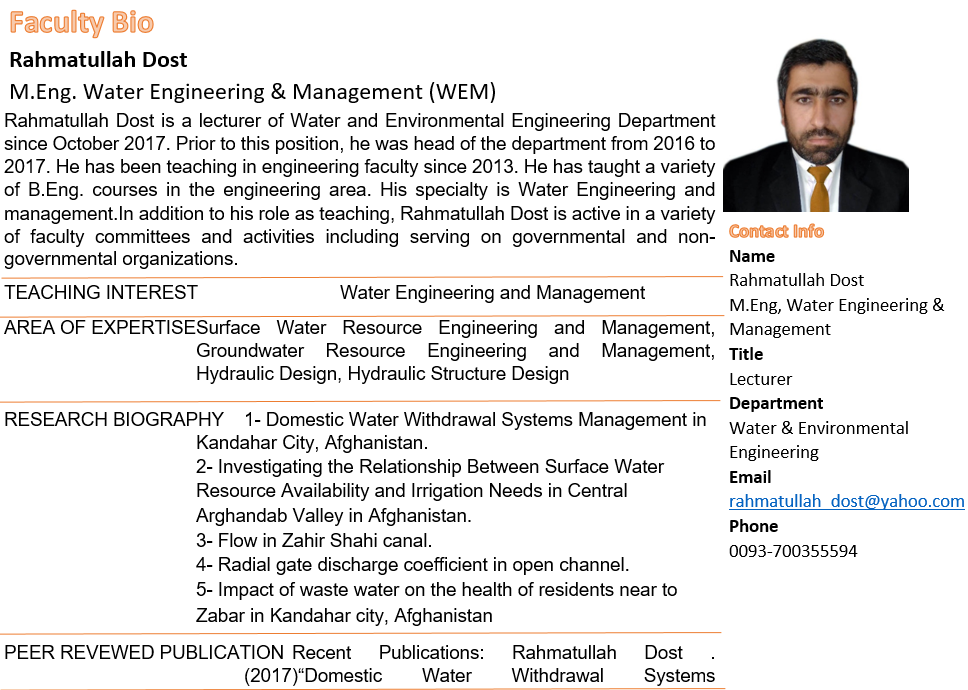
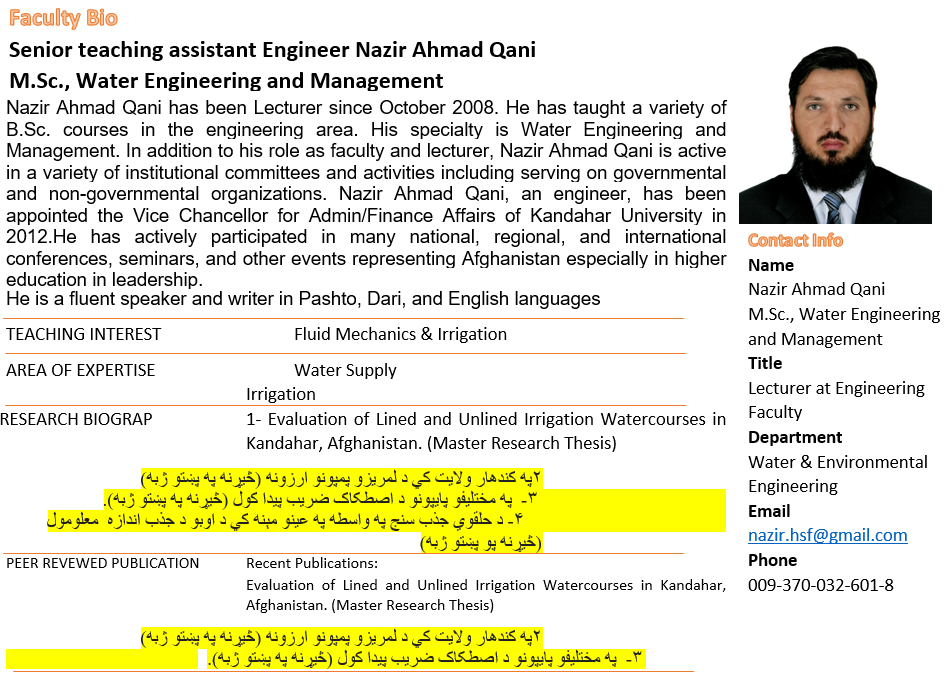
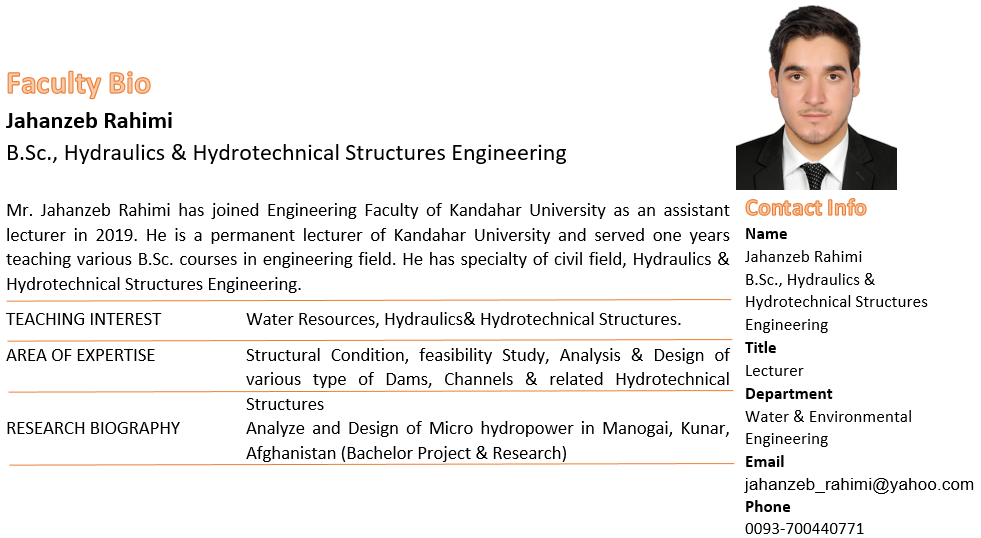
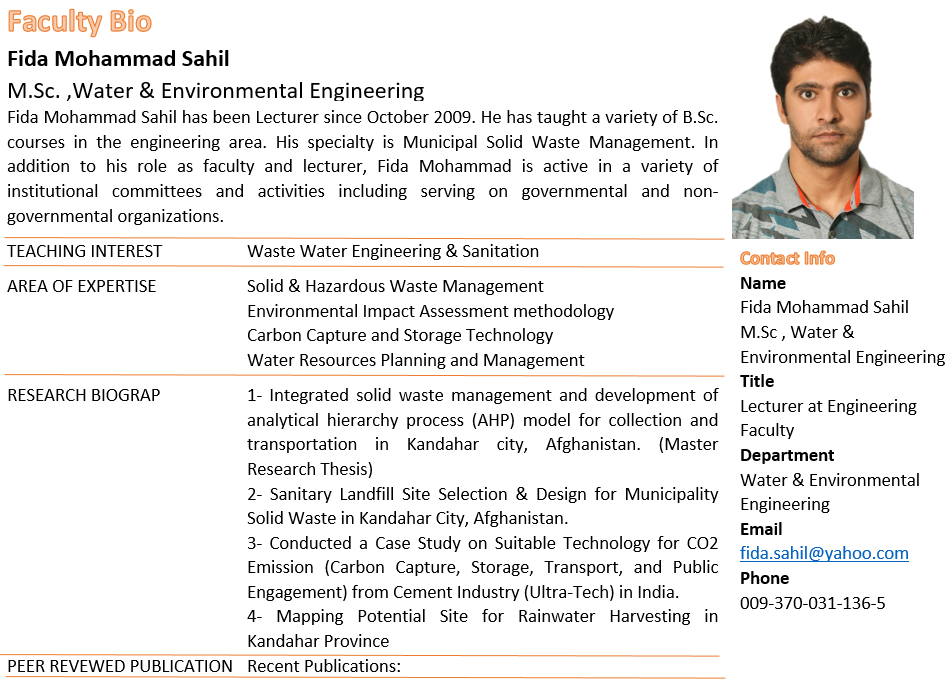
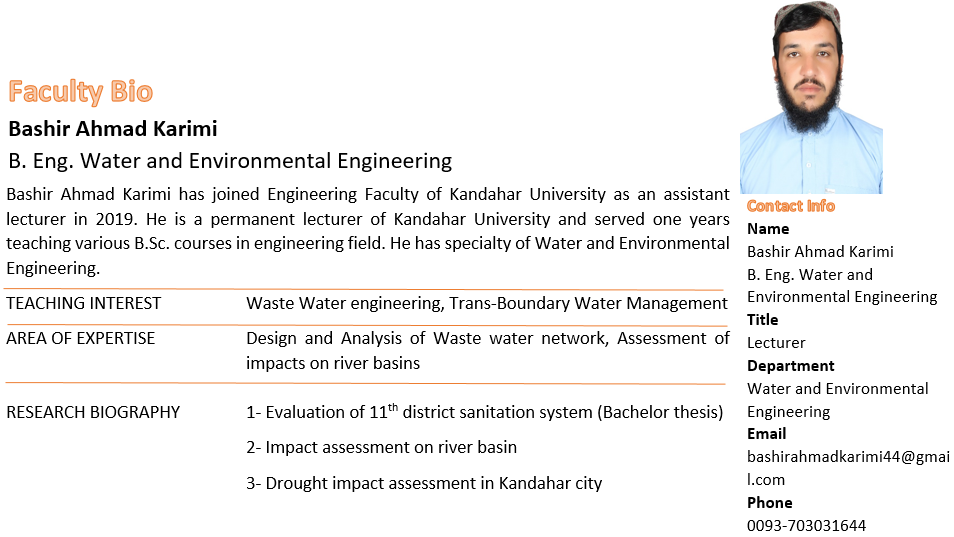
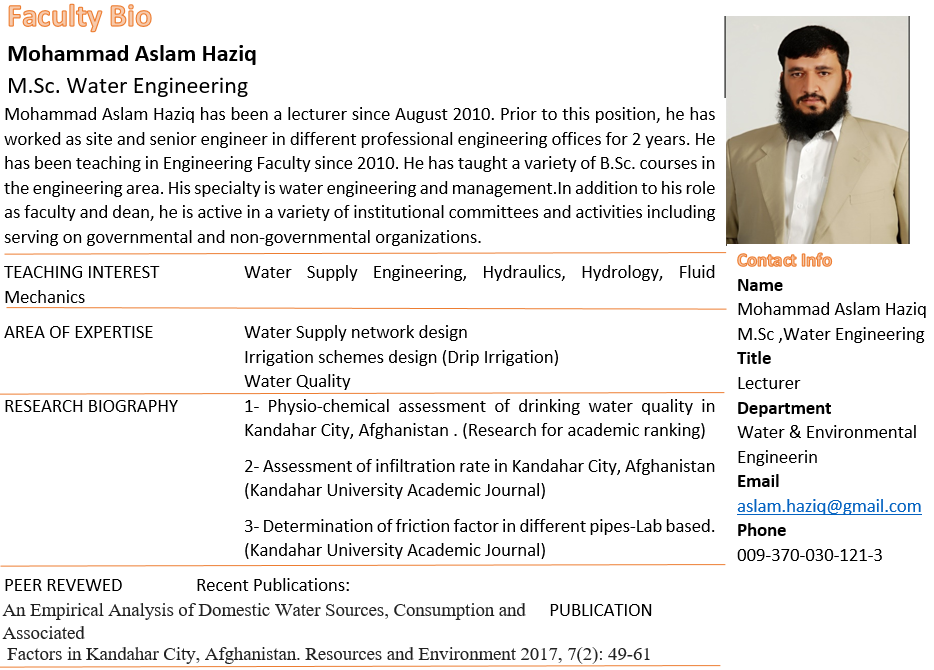
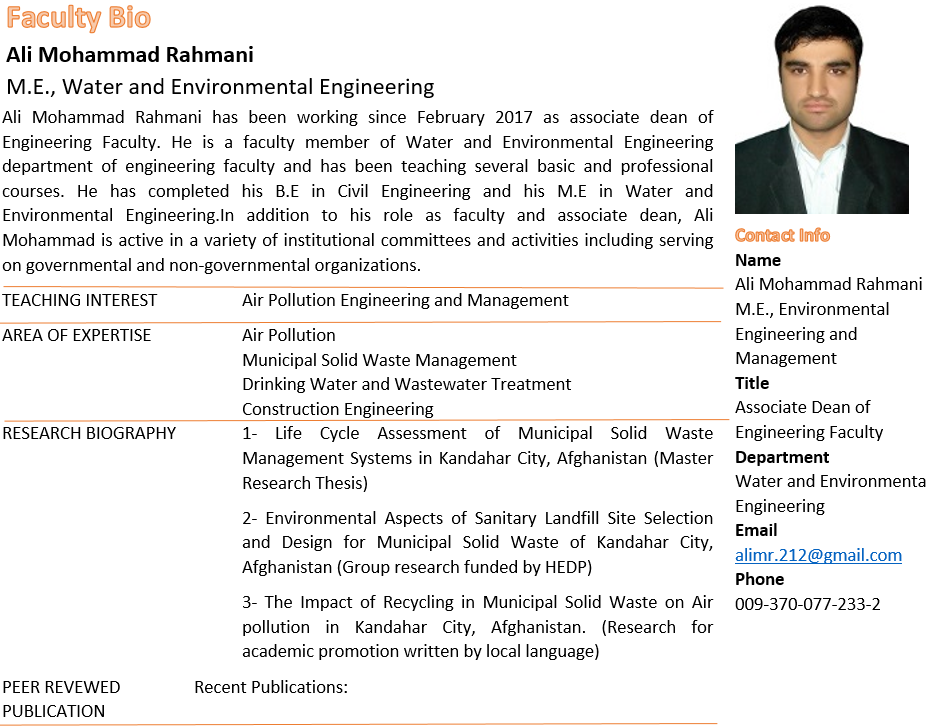
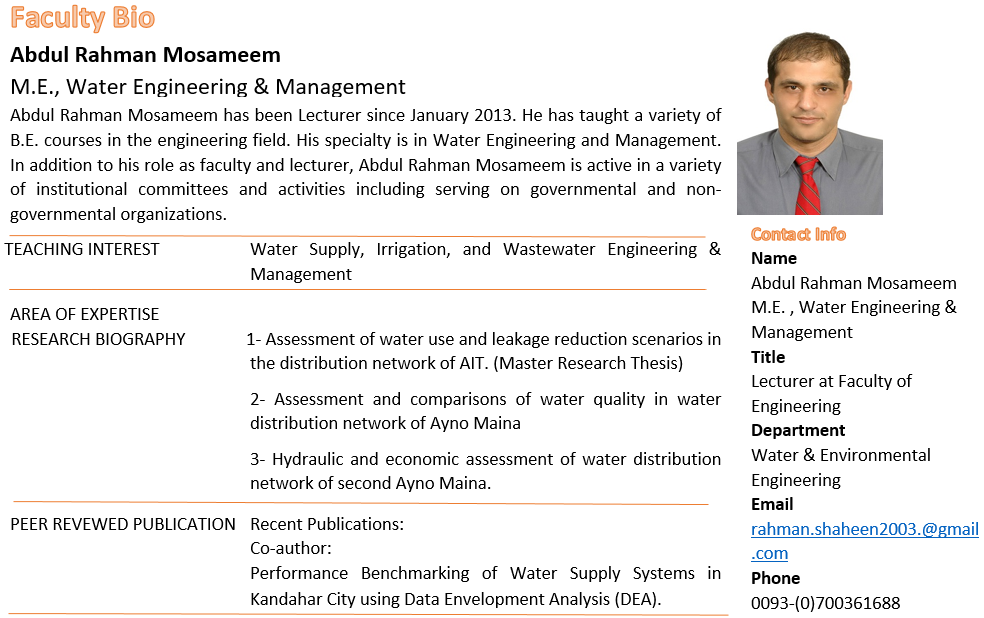
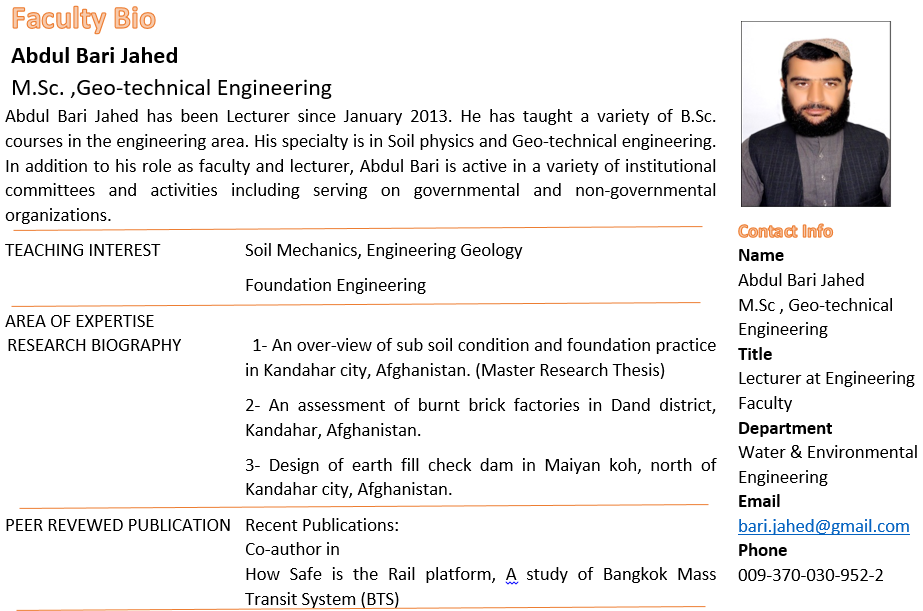
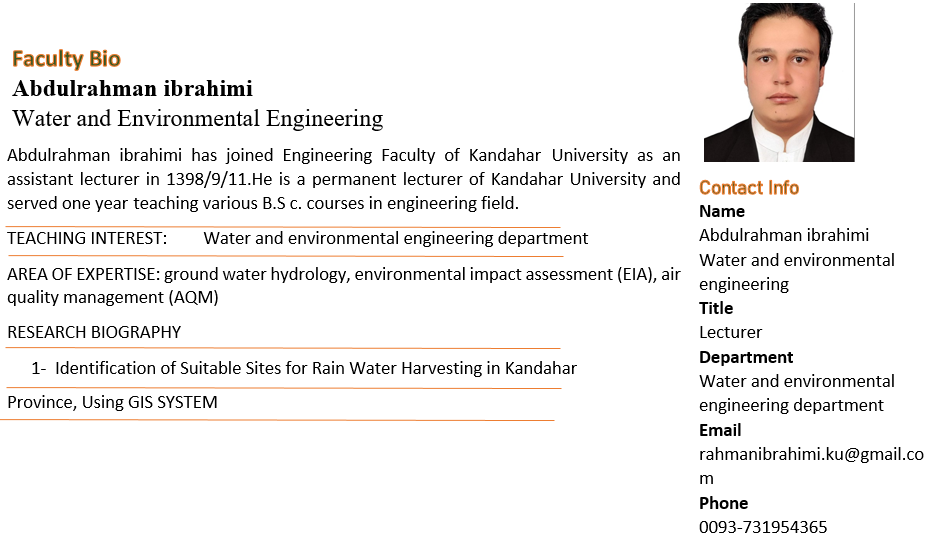
Introduction to Energy Engineering Department :
Due to lots of opportunities and energy related problems in Afghanistan, the Ministry of Higher Education (MOHE) established Energy Engineering Department in the framework of Engineering Faculty of Kandahar University in 2012. The students from all over the country are trained in this department. The curriculum of the department mainly focuses on the:
- Solar Thermal Energy
- Solar Photovoltaic
- Wind Energy
- Hydropower
- Biomass Energy
- Thermal Power Plant
- Combustion Technologies and Materials
- Power Generation, Transmission and Distribution
- Energy Conversion
- Energy and Environment
- Building Heating and Cooling
- Electrical Systems of Buildings
- Energy Efficiency
By the financial support of USWDP, Energy Engineering Department had an active partnership for about two years with Texas A&M University (TAMU) of USA. TAMU supported Energy Engineering Department in updating curriculum, providing teaching materials and pointing out relevant lab equipment. Based on this, Energy Engineering Department was equipped with the modern laboratory, established by the financial support of USWDP and technical support of TAMU. Currently, Energy Engineering has eight lecturers, from which, four of them have perceived their master degrees in the very well-known universities of the world while the rest are bachelors. The department plans to hire other eligible master lecturers also in the near future. Fortunately, the presences of a lot of energy recourses in Afghanistan make it possible for our graduates to have jobs and a leading role in the implementation of almost all energy related projects in the country. The graduates of this department are capable to eliminate almost every energy related problem.
Vision:
Training skilled professionals in the field of energy who can meet the standards of the region at the country and offering them to the society for service.
Mission:
Approaching our vision by the help of new energy related technologies and effective educational and research methods.
Objectives:
- Offering skilled engineers to the society equipped with Islamic and national values in the field of energy.
- Solving energy related difficulties of the society through conducting researches and offering services.
- Investigating best utilization of the available national energy resources for economy development of the country.
Values:
- Accepted national and international quality.
- Respect of Islamic and Afghan sanctities.
- Islamic and human morality and moral of service and patriotism.
- Transparency and prevention of corruption.
Opportunities:
- Support of UN and donors for development of higher education.
- Availability of national energy resources in Afghanistan.
- Great resources of renewable energy.
- Interest of young generation for higher education in the south-western zone.
Head Department Message
Due to years of war and conflict in Afghanistan, all energy and other infrastructures are hugelydamaged. By looking on today’s energy needs of our society, these energy infrastructures need a fundamental work and technical human resources. On the other hand, we have lots of energy resources in the country. Based on these problems and opportunities, the Energy Engineering Department was established in the framework of Engineering Faculty of Kandahar University to graduate talented engineers equipped with Islamic and national values in the field of energy for our society.By the help of our respected expert lecturers, the department struggles to be one of the leading energy engineering departments in the region.We hope that our graduates from all over the country will serve the people in the energy related sectors to enhance the academic and economical situation of the country.On behalf of all Energy Engineering Department respected lecturers, I most welcome the students for this field of study.
Regards
Teaching. Asst. Wais
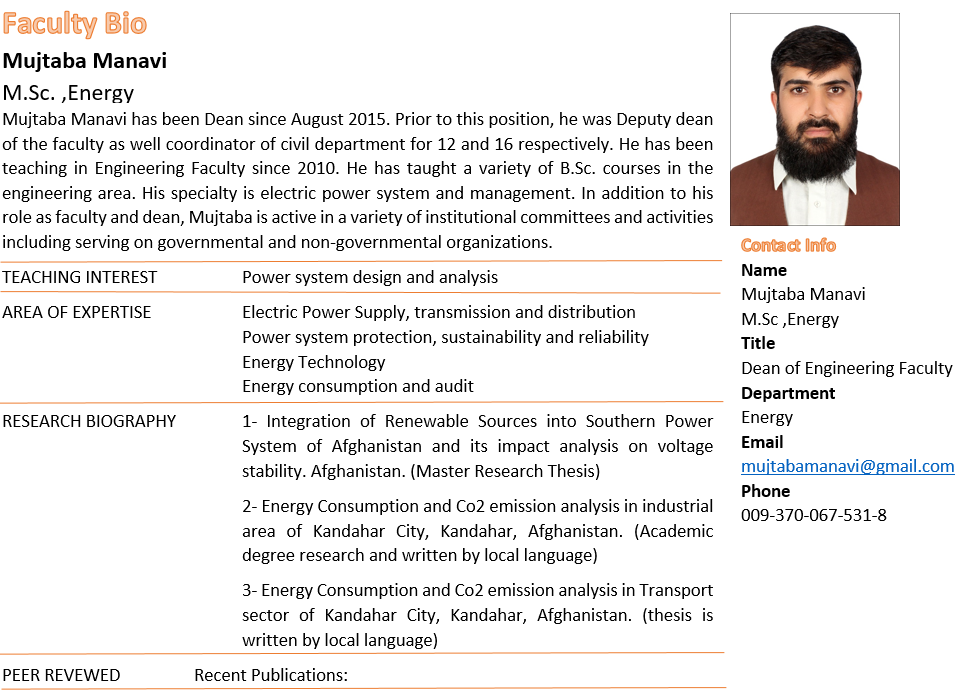
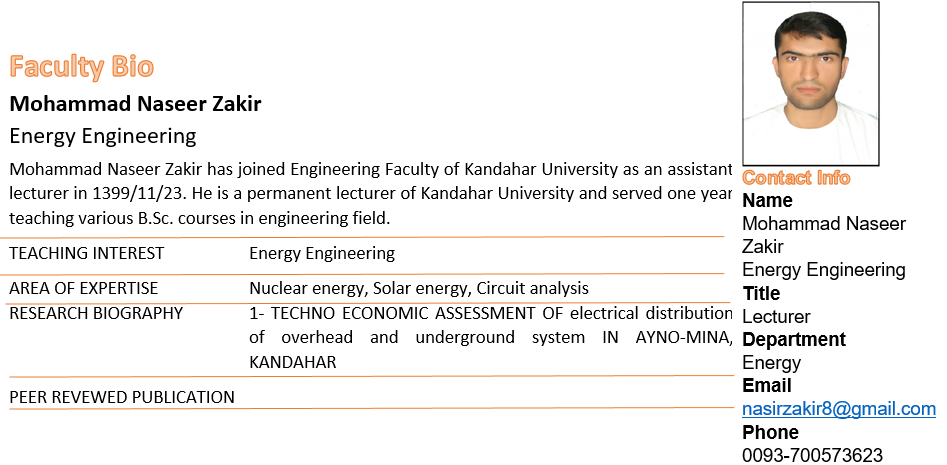
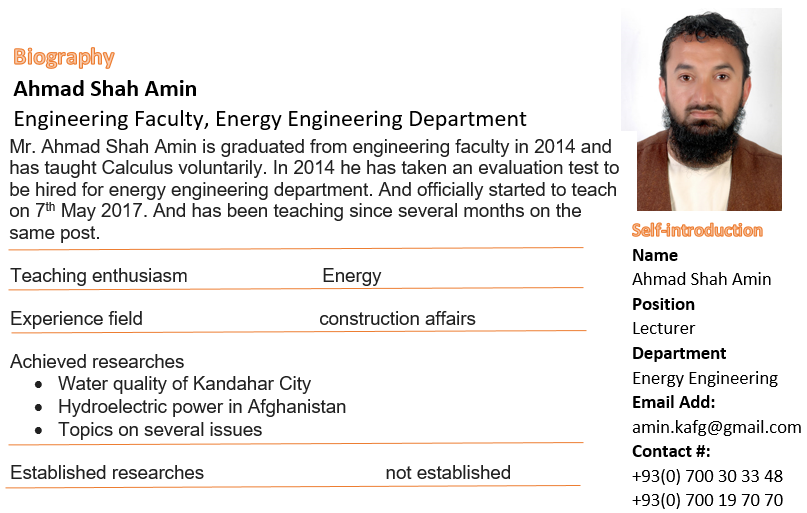
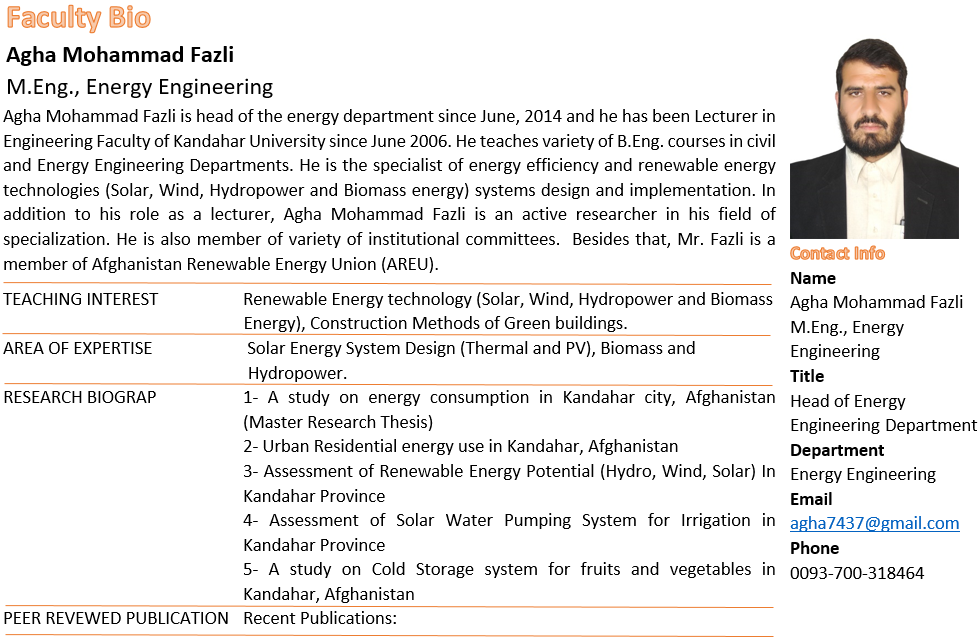
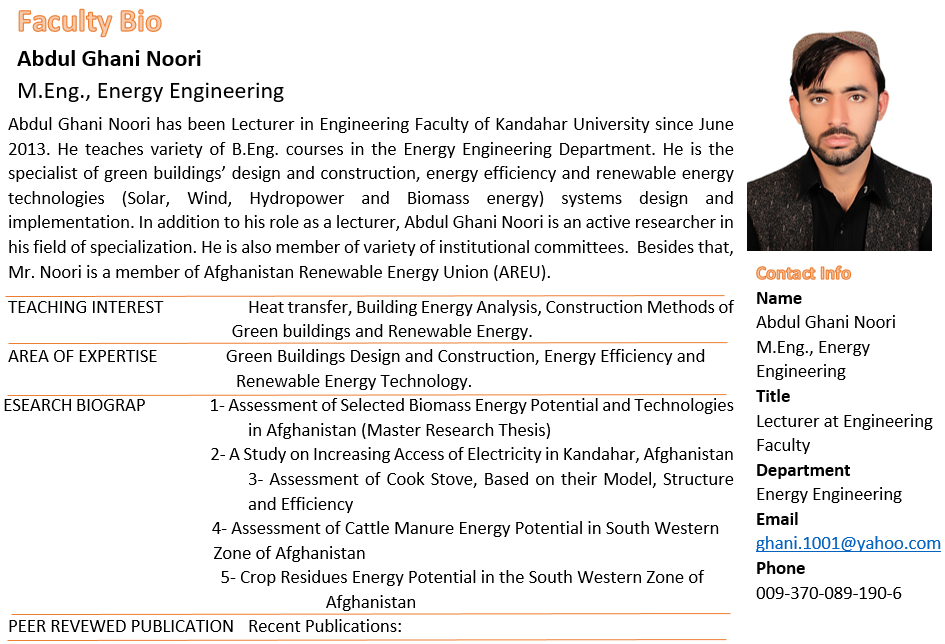
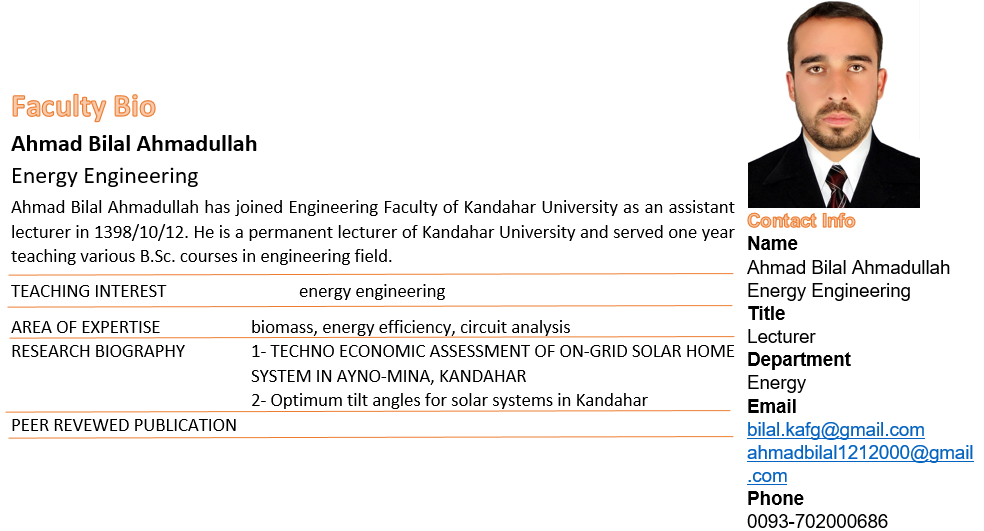
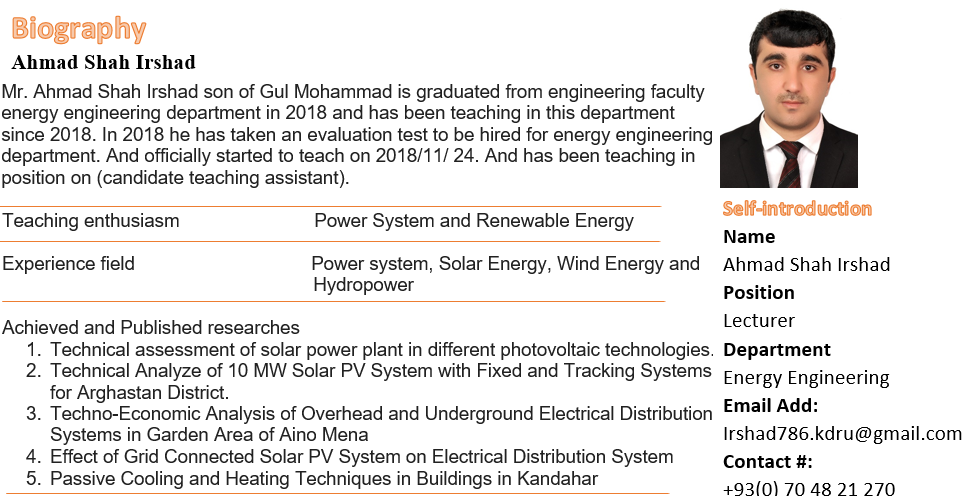
Department of Civil Engineering
Introduction:
Civil Engineering Department was founded in Sep, 2000. It is one of the first academic departments in terms of establishment set up under the Faculty of Engineering. It has 11 fulltime faculty members out of them 6 have Doctor Eng. Degrees,. CE has graduated (951) engineers and currently there are 441 students pursuing their undergraduate program in civil engineering. CE classes are equipped with standard academic requirements. It has one laboratory that has been equipped with some testing instruments by the help of World Bank. The library of the CE department is equipped with more than 1500 text books in different fields of engineering.Since its establishment in 2000, CE has followed the curriculum developed by Ministry of Higher Education that has a five year program included 9 academic semesters and a 5 month practical training program. In 2010, the curriculum of CE department was developed by Kansas State University in a partnership with Kabul University Faculty of Engineering and as a result the five-year program of CE study was changed to four years due to the new curriculum with credit system. Recently, the CE is continuing a four years curriculum that has been developed by MO HE and considered all needs of the governmental sectors, private sectors and the industry sectors in light of the advanced universities’ curriculum of the world, which 85% of text books, lectures, exams and assignments are in English in the light of curriculums of the advanced universities in the world.
Department of Civil Engineering strives to become a well-recognized institution in the country with the support of qualified graduates through better social development and services.
Mission:
Department of Civil Engineering endeavors to create contemporary academic environment through standardized teaching, academic research, design and practical work (laboratory).
Objectives:
To support its mission and vision, the department of civil engineering has established objectives based on engineering market demand in the country.
- Encourage faculty and students to be aware of and involved with social problems and issues related to professional development
- Faculty involvement in professional societies including the organization of major professional meetings and conferences
- Active interaction and cooperation with outside agencies including local, private and governmental agencies to act as a consulting source for the country and region
- To provide quality education for undergraduate students and enhance student-faculty engagement which include student participation in faculty research projects and student involvement in professional society activities.
- To graduate civil engineers with high level of commitments to the country with respect to national and international legal frameworks, cultural and Islamic values.
- To graduate civil engineers that have the necessary knowledge and skills for assessment and recognizing alternatives in designing related to social, economic, environmental and public safety projects.
- To graduate civil engineers having necessary verbal & written communication skills for success in their professions and be able to function effectively on teams.
Facilities in the context of this strategic plan are considered to be the building and equipment that support the DCE’s activities in these spaces, it is necessary to have reasonable infrastructures in order to perform the daily activities and be able to implement all planned activities. In addition, adequate infrastructures will enable DCE to act associated to its vision and mission. Currently DCE does not have enough space in the existing building. A new building (Academic building for KEF) is constructing by support of World Bank through Strengthening of Higher Education Program. It has a laboratory which is equipped with some instruments with the help of World Bank for Engineering Faculty. It also has a computer lab and a small professional library with the support of United State Army Corps of Engineers (USACE).
Laboratory:
DEC has a laboratory which is equipped with some instruments, which 40% of them are physically practicable and the rest needs collaboration. One technician is responsible for doing test; however, it needs at least three trained technician. Another challenge is inadequate electricity at Kandahar University; therefore, having electrical generators will solve this problem. DEC is working on to collaborate all equipment and will be able to do each type of test for the students.
Library:
DEC has a professional library having and reference books. Most of the books are up-to-date in different disciplines. Lecturers can borrow the books but students can do photo copy only.
Academic Facilities:
In order to enable DEC to perform the academic, administrative and other services successfully, additional facilities need to be installed.
- Supply of academic council roof of DEC with essential equipment
- Provision of academic facilities as video conference rooms, publication presses and research center
- Provision of study room for student’s group discussion
- Provision of transportation facilities for student field visits
- Provision of conference hall
Capacity Development:
DCE is a young engineering higher education department which has been in operation for 13 years. Since having well educated and expert faculty members are vital to the development of a high quality department, DCE has planned capacity development programs through partnerships with national & international higher education institutions.
DCE is eager to establish academic partnership with some national and international universities in order to increase the capacity and enhance the level of education. These partnerships will enable DCE to develop more quickly in light of the new technologies and research at regional and international levels. Curriculum development, joint research programs, faculty exchanges, MSc and PhD programs and other essential academic activities will be planned in the packages of partnerships as following.
Capacity Development of Young Faculty Members:
- Recruitment of 8 new faculty members
- From B.Eng to MSc, 10 faculty members in various fields of civil engineering
- From MSc to PhD, 6 faculty members in various fields of civil engineering
The feedback of strategic plan implementation:
With successful implementation of the strategic plan, the existing problems and shortages of DCE will be solved and as a result a suitable education environment will be created. DCEwill be enabled to graduate students with better quality to Afghan society and they will be ableto apply knowledge of mathematics, science and engineering to design and conduct experiments, as well as to analyze and interpret data.
Analysis
Each department has its own strength, weakness, opportunities and treats.DCE has carried out the SWAT analysis in order to know the various important components of SWAT to think aboutfeasible implementation of the strategic plan.
Strength:
- The huge number of students in schools and the demand for higher education in the country.
- The faculty members are young and 95% lecturers have MSc degree
- As country is in rehabilitation process, it needs more qualified Afghan civil engineers.
- Availability of a strong and committed team for the development of DCE.
- Applying credit system within a new curriculum
- A well-equipped computer lab connected with internet
Weaknesses:
- The faculty members do not have enough experiences.
- No lecturers at PhD level
Opportunities:
- Attention of international aid agencies and friendly countries for the development of higher education in Afghanistan.
- The interest of people with higher education and especially the young generation in the region.
Threats:
- The security condition
- Lack of financial and academic independent
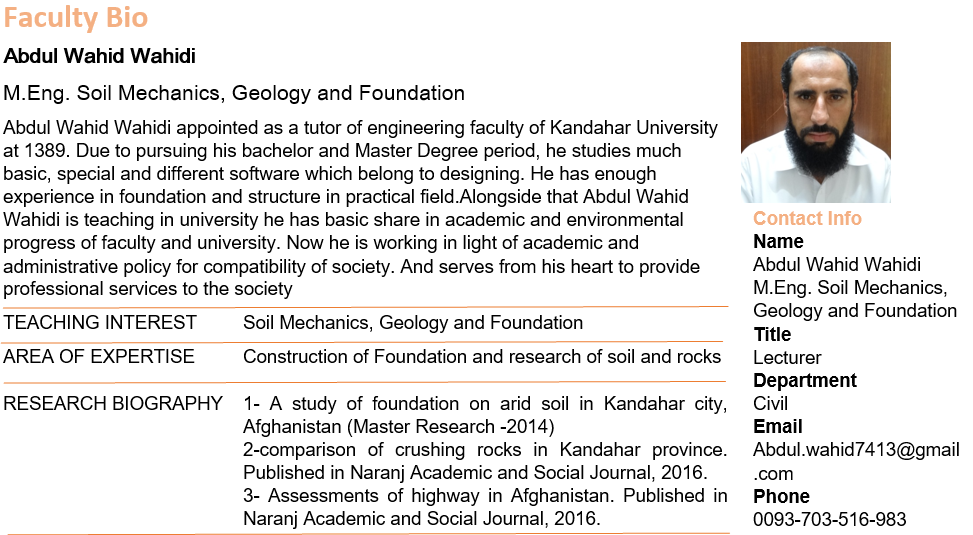
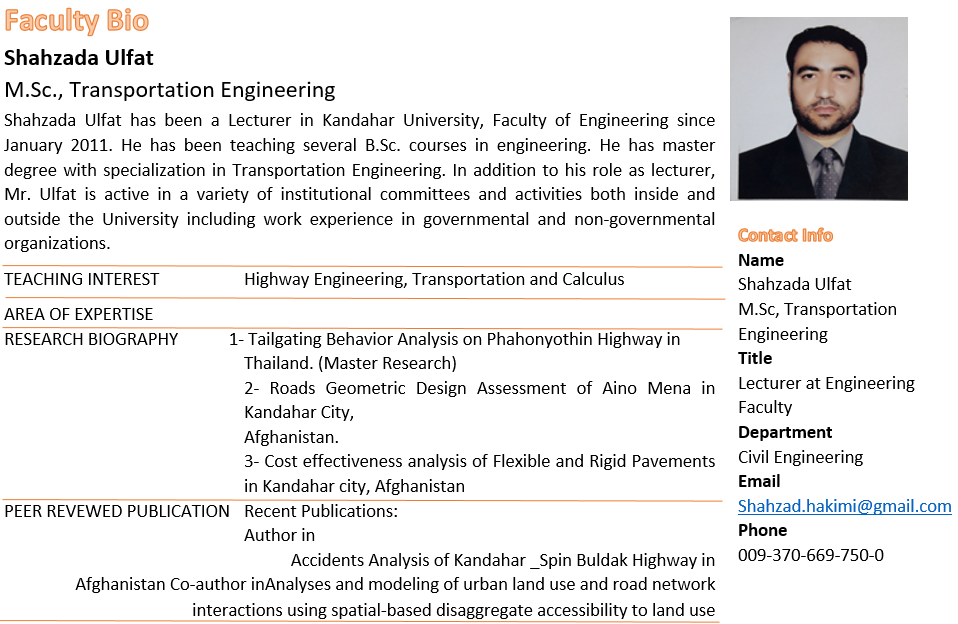
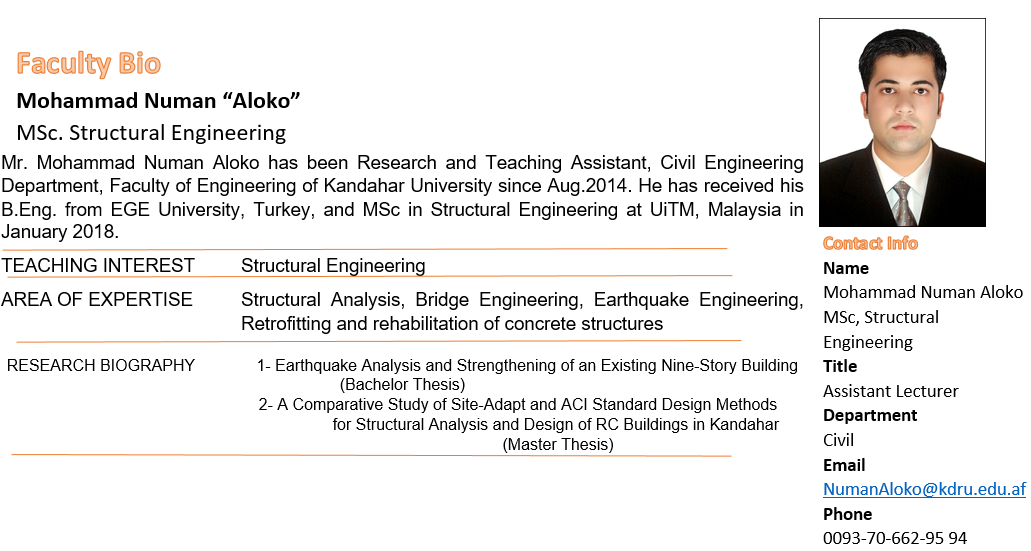
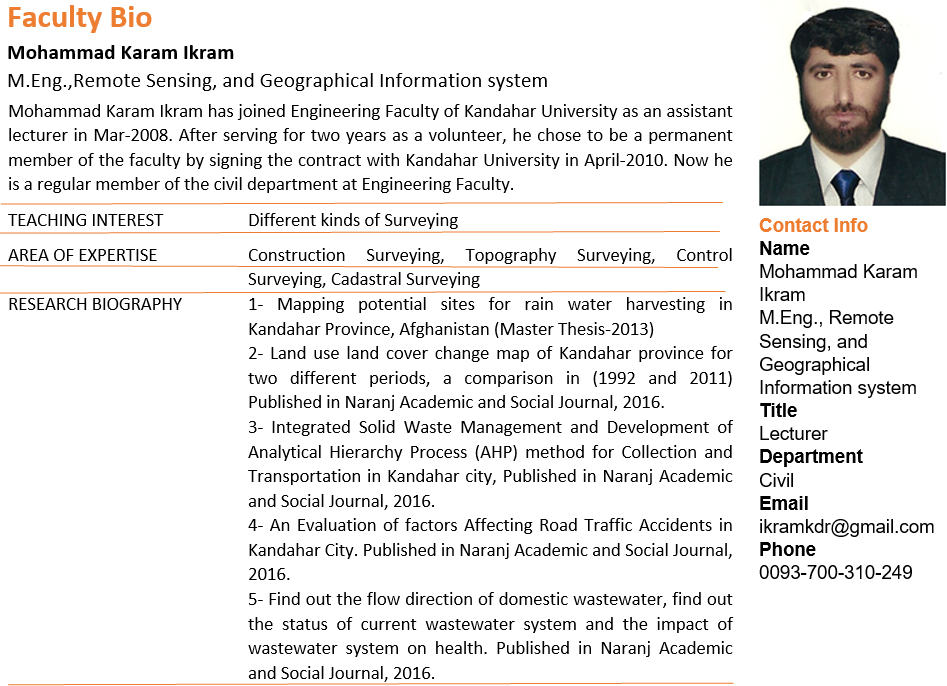
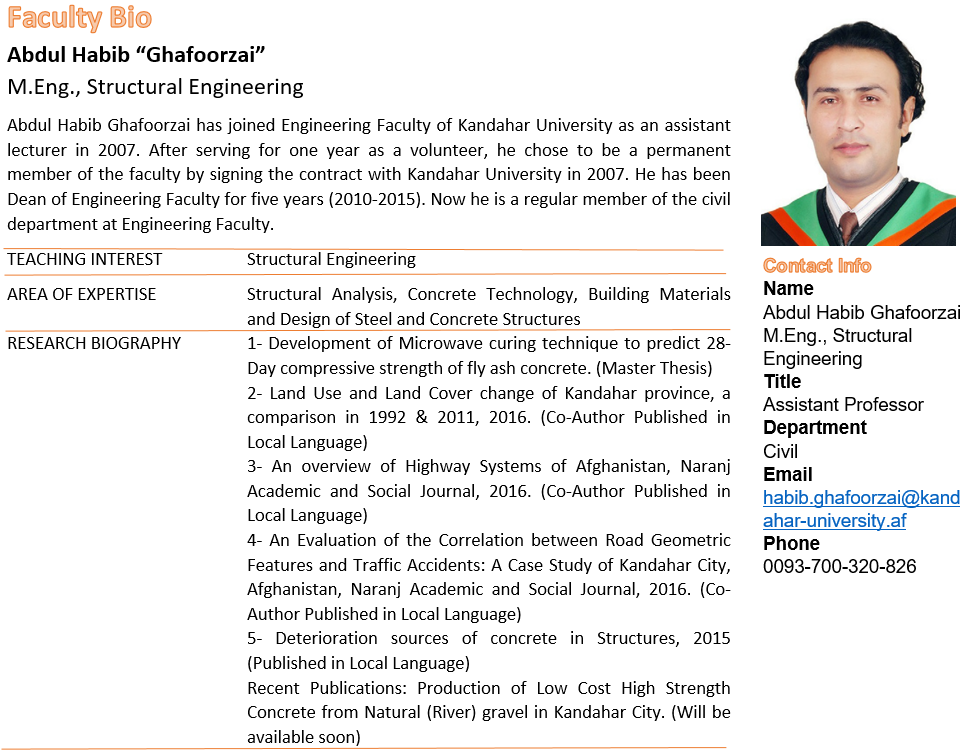
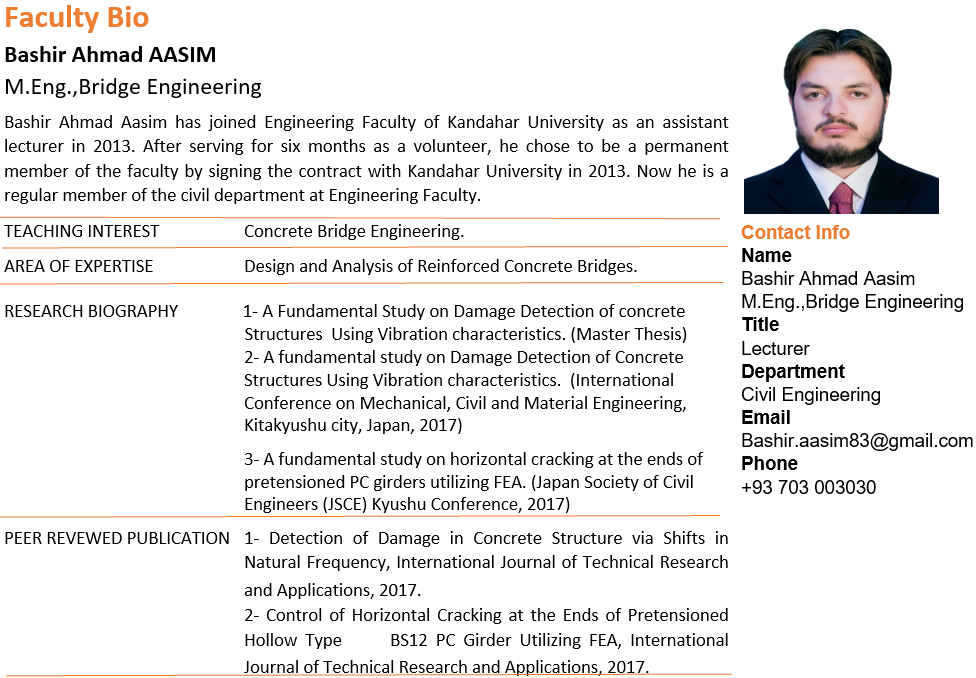
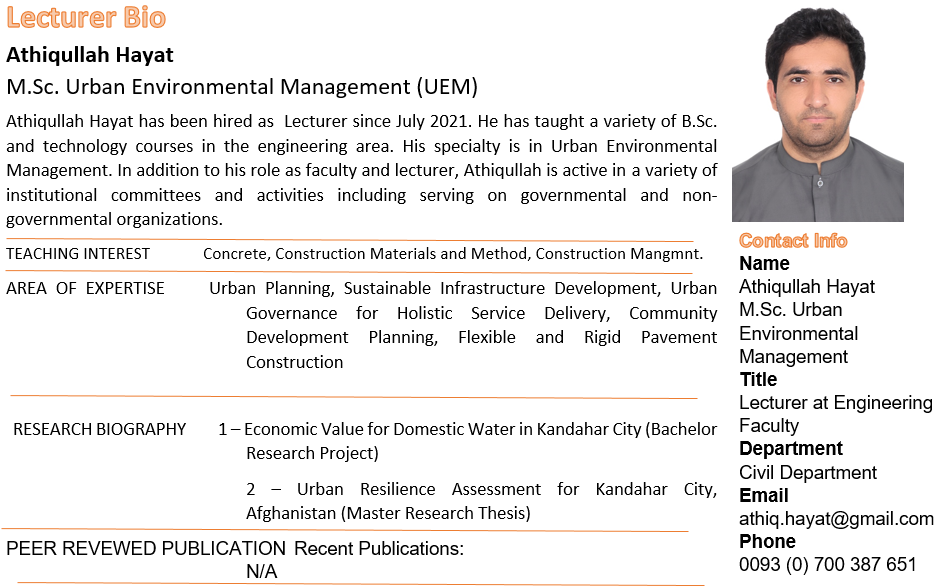
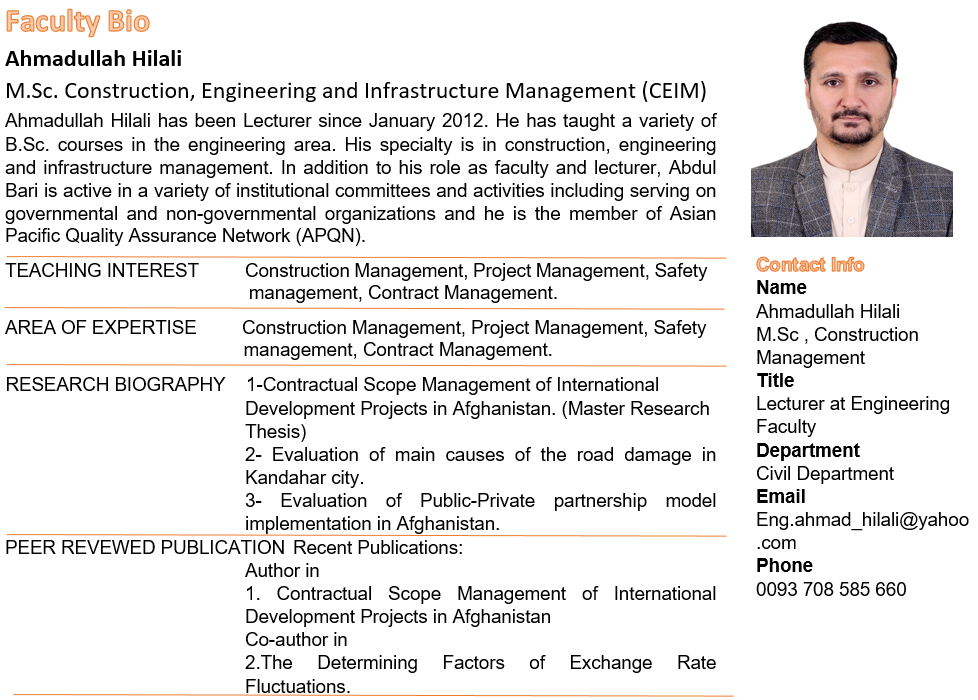
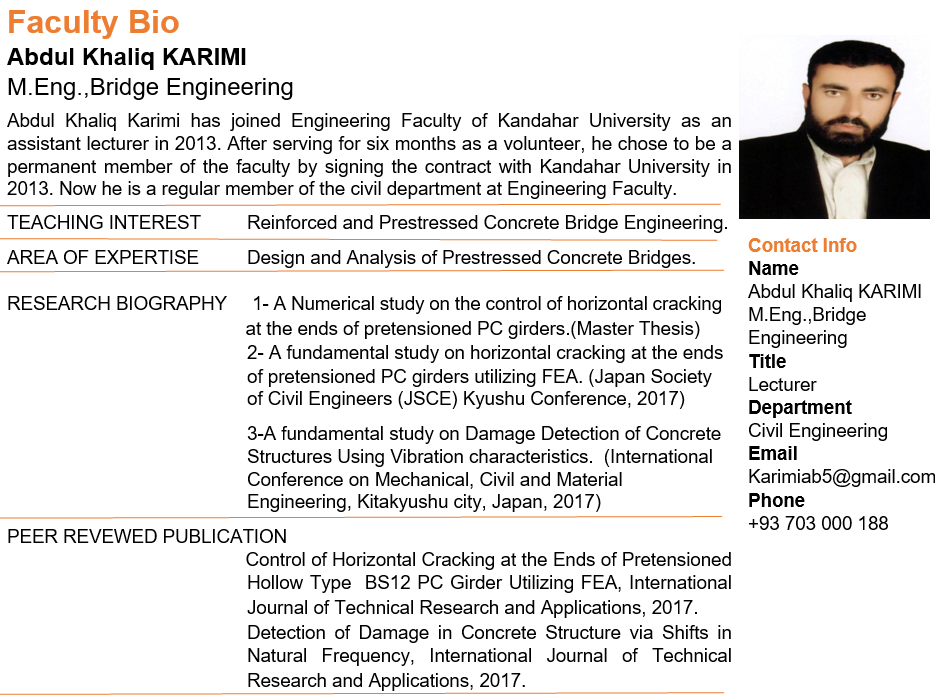
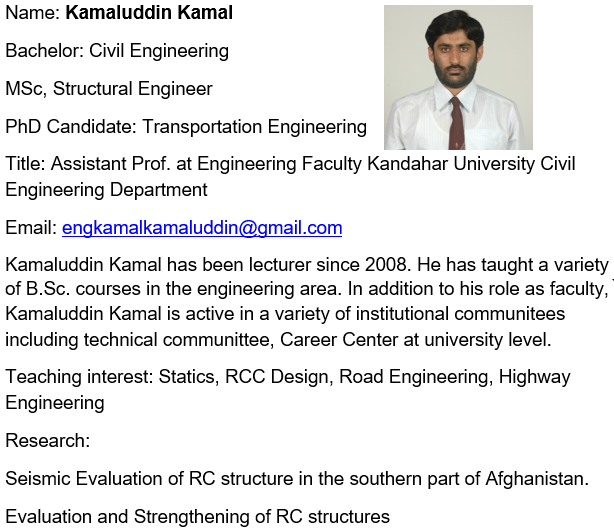
Introduction to architectural department:
Despite the hardships and opportunities, the ministry of higher education established the architecture department in kandahar university in 2015.
A number of students from various provinces has been attending the department, and are being trained in the subsequent fields:
Sustainable Architecture
Architecture & Building Design
Landscape Architecture
Town Planning
Cultral & Economical Design
Currently the department is led by six professors. From which two of them have graduated from masters program in renowned universities and one of them is practicing the program at the moment. The department is also in the pursuit of hiring qualified masters.
Vision:
The architectural department wishes to be the leading and the best department, and put forth architects with both knowledge and practical skills to the society, to provide sufficient solutions to contemporary architectural voids and relevant research.
Mission:
The architecture department tries to reach its vision, so that it can provide a professional environment for both students and teachers in order to play a bigger role in a national level to design and research.
Objectives:
- To put froth professional architects equipped with national and islamic values to the community.
- Providing services, research and ideal solutions in architecture for society.
Values:
- Accepted national and international quality.
- Respecting afghan and islamic sacred beliefs
- Islamic and humanitarian ethics, the spirit of service and patriotism.
- Translucence and the prevention of corruption.
Opportunities:
- The expansion of higher education through the support of funding societies and friendly nations’ help.
- Working opportunities in town planning and house planning.
- The inclination of new generations towards higher education in south western region.
Message from the head of the architecture department:
Because of decades of war, the destruction of infrastructures and cities, and the bad economic situation and inflation needs a fundamental and professional force. So we found that necessary to introduce qualified architects in architecture department for the oppressed people of our nation.The department which is established in Kandahar university engineering faculty, tries to gain first position in educational and professional background through experienced and certified teachers. And introduce engineers with afghan and Islamic values to the society.The department wishes the young cadres from various provinces to serve their country through this important and professional field, and apart from filling the educational gaps, they should also be the cause of an improved economy. On behalf of all the respected professors in the department the head of the department welcomes all of the students.
With regards : Professor Muhammad Mujahed Azizi
